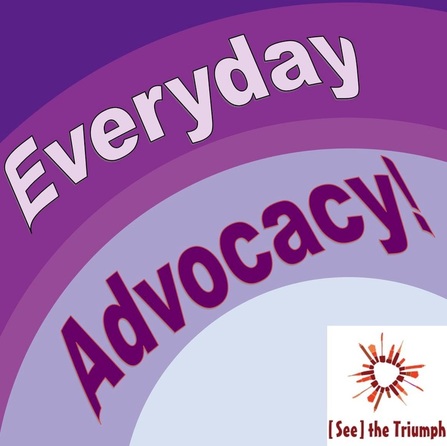|
By Christine Murray, See the Triumph Co-Founder
What does advocacy mean to you? This question inspired our series this month on “Everyday Advocacy,” and we hope you’ll join with us this month in thinking about what it means to be an advocate for ending intimate partner violence and the stigma surrounding it. We know that so many of the members of our See the Triumph community are strong advocates already, and you inspire us by all the ways you work to promote safe, healthy relationships and raise awareness about intimate partner violence. Allison Crowe, my Co-Founder at See the Triumph, and I have really embraced the advocacy work that we do through See the Triumph. The truth is, though, that when we first started this campaign in January 2013, our initial focus was using this campaign as a way to disseminate our research, and I don’t think either one of us would have envisioned at the time how much more the advocacy role would grow to be so important to us. As we moved forward with the campaign, we saw more and more the potential of the campaign to promote positive social change. And so, we quickly found ourselves in the role of advocates, working to end the stigma surrounding intimate partner violence and develop resources to support survivors. Our partnership with the Stop Abuse Campaign helped to further solidify this identity. Allison and I are both professors, so in many ways stepping into advocacy work has been a stretch for us--we didn’t receive training on this in graduate school!--but we both now view advocacy as central to the work we do. Personally, embracing the advocacy role has been an exciting and, at times, honestly, uncomfortable journey for me. At times, advocacy work feels like you’re putting yourself and your viewpoints out there for all the world to see (and critique!), and so there’s a certain level of vulnerability that comes along with this type of work. And yet, despite those risks, I find myself more and more drawn to advocacy work, not just because it has the potential to make a difference, but because it is so, so needed. Unfortunately, intimate partner violence and other forms of abuse are deeply entrenched in our society, and the stigma that surrounds it presents a major barrier to survivors and others who support them, as well as those who work to prevent and respond to violence in communities all over the country. The task before us is a huge one, but working together I believe we can really make a difference toward creating a safe, nonviolent world. All throughout this month, we want to share resources and ideas to help you consider ways to take on “Everyday Advocacy” efforts--big and/or small--to raise awareness about intimate partner violence and promote the types of social changes that will help to end it. Our four main themes for the month are: 1. Advocacy means taking action to promote positive change within social systems. 2. Everyone can be an advocate for ending intimate partner violence and supporting survivors. 3. Advocacy efforts can be big and/or small. 4. Survivors themselves have a unique and powerful role to play as advocates We look forward to hearing your thoughts throughout the month, and especially your own advocacy ideas and experiences that can help inspire us and others to do more! Comments are closed.
|
Archives
July 2024
CategoriesAll About Intimate Partner Violence About Intimate Partner Violence Advocacy Ambassadors Children Churches College Campuses Cultural Issues Domestic Violence Awareness Month Financial Recovery How To Help A Friend Human Rights Human-rights Immigrants International Media Overcoming Past Abuse Overcoming-past-abuse Parenting Prevention Resources For Survivors Safe Relationships Following Abuse Schools Selfcare Self-care Sexual Assault Sexuality Social Justice Social-justice Stigma Supporting Survivors Survivor Quotes Survivor-quotes Survivor Stories Teen Dating Violence Trafficking Transformative-approaches |
Search by typing & pressing enter



 RSS Feed
RSS Feed